module2《reading and vocabulary》(外研版必修5)
- 格式:ppt
- 大小:776.50 KB
- 文档页数:15
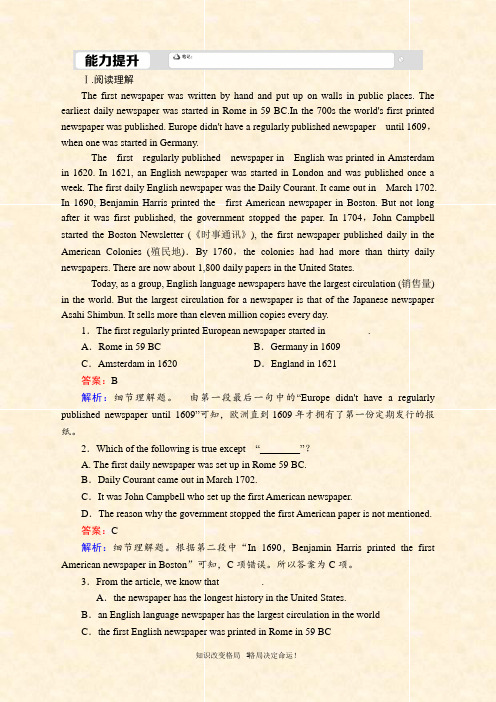
Ⅰ.阅读理解The first newspaper was written by hand and put up on walls in public places. The earliest daily newspaper was started in Rome in 59 BC.In the 700s the world's first printed newspaper was published. Europe didn't have a regularly published newspaper until 1609,when one was started in Germany.The first regularly published newspaper in English was printed in Amsterdam in 1620. In 1621, an English newspaper was started in London and was published once a week. The first daily English newspaper was the Daily Courant. It came out in March 1702. In 1690, Benjamin Harris printed the first American newspaper in Boston. But not long after it was first published, the government stopped the paper. In 1704,John Campbell started the Boston Newsletter (《时事通讯》), the first newspaper published daily in the American Colonies (殖民地).By 1760,the colonies had had more than thirty daily newspapers. There are now about 1,800 daily papers in the United States.Today, as a group, English language newspapers have the largest circulation (销售量) in the world. But the largest circulation for a newspaper is that of the Japanese newspaper Asahi Shimbun. It sells more than eleven million copies every day.1.The first regularly printed European newspaper started in ________.A.Rome in 59 BC B.Germany in 1609C.Amsterdam in 1620 D.England in 1621答案:B解析:细节理解题。
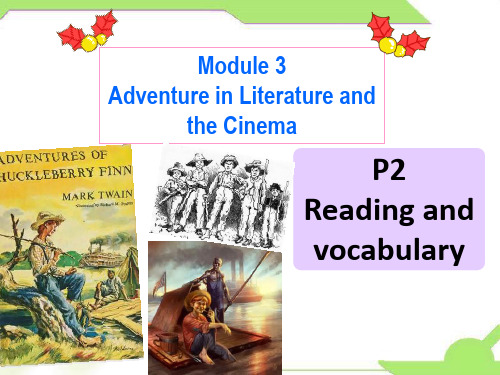

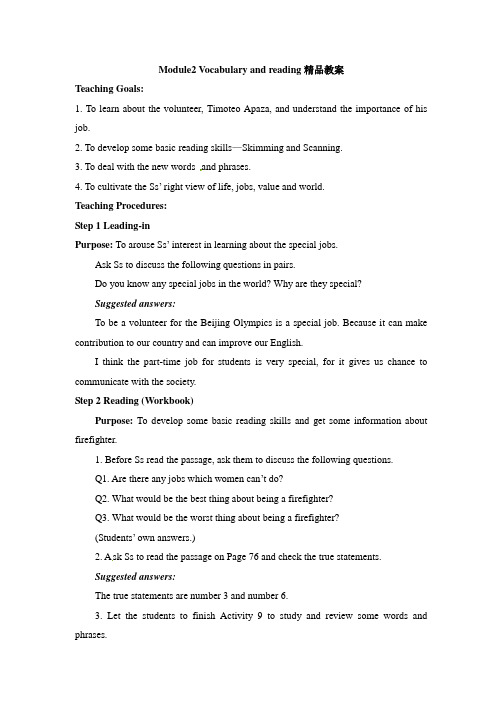
Module2 Vocabulary and reading精品教案Teaching Goals:1. To learn about the volunteer, Timoteo Apaza, and understand the importance of his job.2. To develop some basic reading skills—Skimming and Scanning.3. To deal with the new words and phrases.4. To cultivate the Ss’ right view of life, jobs, value and world.Teaching Procedures:Step 1 Leading-inPurpose: To arouse Ss’ interest in learning about the special jobs.Ask Ss to discuss the following questions in pairs.Do you know any special jobs in the world? Why are they special?Suggested answers:To be a volunteer for the Beijing Olympics is a special job. Because it can make contribution to our country and can improve our English.I think the part-time job for students is very special, for it gives us chance to communicate with the society.Step 2 Reading (Workbook)Purpose: To develop some basic reading skills and get some information about firefighter.1. Before Ss read the passage, ask them to discuss the following questions.Q1. Are there any jobs which women can’t do?Q2. What would be the best thing about being a firefighter?Q3. What would be the worst thing about being a firefighter?(Students’ own answers.)2. A sk Ss to read the passage on Page 76 and check the true statements.Suggested answers:The true statements are number 3 and number 6.3. Let the students to finish Activity 9 to study and review some words and phrases.Suggested answers:1) eye test 2) well paid 3) fit 4) administrative 5) advice 6) career prospectsStep 3 Pre-reading(Vocabulary)Purpose: To review and learn the names of some jobs.1. Ask Ss to review the jobs of the following pictures that we studied last period.2.Ask Ss to read the words in activity 1 and check the meanings of them, then match the words with their meanings.Suggested answers:(1) electrician (2) miner (3) cook (4) biochemist (5) barber(6) secretary (7) accountant (8) businessman/ businesswoman(9) policeman (10) volunteerThen divide the jobs into the following groups:Modern: electrician, biochemist, accountant, businessman/ businesswoman, policemanTraditional: miner, cook/ chef, barber, secretary, volunteer, policemanStep 4 While-readingPurpose: To develop some basic reading skills and get some information about the volunteer Timoteo Apaza, and understand the importance of his job and to deal with the new words and phrases in the text.1. Group Work: Turn to P12 and ask Ss to look at the picture and answer the questions.Q1. Where is the man standing?Q2. What is he holding?Q3. Can the bus driver seethe lorry?Q4. Can the lorry driver see the bus?Q5. So what is the man doing there?Q6. What do you think of the job? Is it important?Q7. Why does he choose it? What kind of person is he? And do you want to know something about him?。
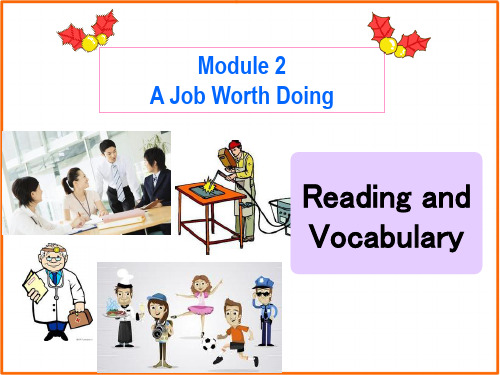
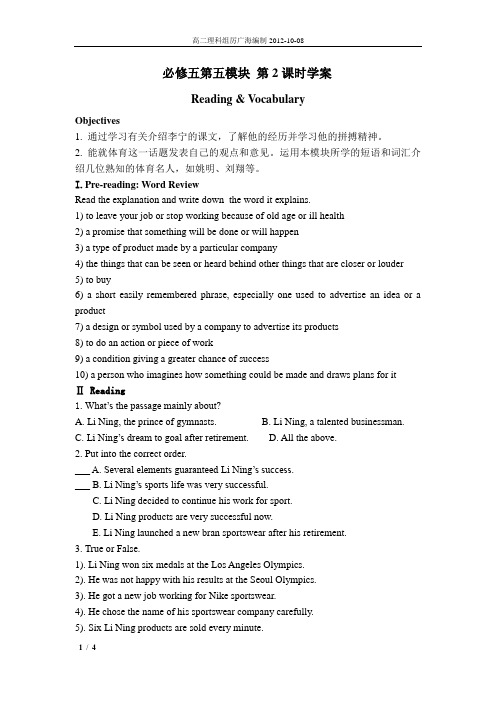
必修五第五模块第2课时学案Reading & VocabularyObjectives1. 通过学习有关介绍李宁的课文,了解他的经历并学习他的拼搏精神。
2. 能就体育这一话题发表自己的观点和意见。
运用本模块所学的短语和词汇介绍几位熟知的体育名人,如姚明、刘翔等。
I.Pre-reading: Word ReviewRead the explanation and write down the word it explains.1) to leave your job or stop working because of old age or ill health2) a promise that something will be done or will happen3) a type of product made by a particular company4) the things that can be seen or heard behind other things that are closer or louder5) to buy6) a short easily remembered phrase, especially one used to advertise an idea or a product7) a design or symbol used by a company to advertise its products8) to do an action or piece of work9) a condition giving a greater chance of success10) a person who imagines how something could be made and draws plans for itⅡ Reading1.What’s the passage mainly about?A. Li Ning, the prince of gymnasts.B. Li Ning, a talented businessman.C. Li Ning’s dream to goal after retirement.D. All the above.2. Put into the correct order.___ A. Several elements guaranteed Li Ning’s success.___ B. Li Ning’s sports life was very successful.___ C. Li Ning decided to continue his work for sport.___ D. Li Ning products are very successful now.___ E. Li Ning launched a new bran sportswear after his retirement.3. True or False.1). Li Ning won six medals at the Los Angeles Olympics.2). He was not happy with his results at the Seoul Olympics.3). He got a new job working for Nike sportswear.4). He chose the name of his sportswear company carefully.5). Six Li Ning products are sold every minute.6). Li Ning clothes are worn by the national teams of France and Italy.7). In 1991 he opened a school with Pele and Muhammad Ali.8). He wants to help children become good at sport.4. Work in pairs and discussion the questions.1). Why did Li Ning start a sportswear company?2). Why has he been successful?5. Suppose one of you is Li Ning, and the other two or three students are news reporters. Ask and a nswer Li Ning’s life (fr om the passage) as a gymnast or a businessman.Ⅲ. Language Points1.They called him the prince of gymnasts.call +宾语+宾补We all call the baby Jack.What do you call this kind of flower?★此结构还经常用于被动语态.Li Ning ____________ the prince of gymnasts.2. six out of seven = six in seven 七个当中有六个The map is drawn to a scale of one of ten thousand.这张地图是按万分之一的比例绘制的。
Module2 Vocabulary and reading教案Teaching Goals:1. To learn about the volunteer, Timoteo Apaza, and understand the importance of his job.2. To develop some basic reading skills—Skimming and Scanning.3. To deal with the new words and phrases.4. To cultivate the Ss’ right view of life, jobs, value and world.Teaching Procedures:Step 1 Leading-inPurpose: To arouse Ss’ interest in learning about the special jobs.Ask Ss to discuss the following questions in pairs.Do you know any special jobs in the world? Why are they special?Suggested answers:To be a volunteer for the Beijing Olympics is a special job. Because it can make contribution to our country and can improve our English.I think the part-time job for students is very special, for it gives us chance to communicate with the society.Step 2 Reading (Workbook)Purpose: To develop some basic reading skills and get some information about firefighter.1. Before Ss read the passage, ask them to discuss the following questions.Q1. Are there any jobs which women can’t do?Q2. What would be the best thing about being a firefighter?Q3. What would be the worst thing about being a firefighter?(Students’ own answers.)2. A sk Ss to read the passage on Page 76 and check the true statements.Suggested answers:The true statements are number 3 and number 6.3. Let the students to finish Activity 9 to study and review some words and phrases.1) eye test 2) well paid 3) fit 4) administrative 5) advice 6) career prospectsStep 3 Pre-reading(Vocabulary)Purpose: To review and learn the names of some jobs.1. Ask Ss to review the jobs of the following pictures that we studied last period.2.Ask Ss to read the words in activity 1 and check the meanings of them, then match the words with their meanings.Suggested answers:(1) electrician (2) miner (3) cook (4) biochemist (5) barber(6) secretary (7) accountant (8) businessman/ businesswoman(9) policeman (10) volunteerThen divide the jobs into the following groups:Modern: electrician, biochemist, accountant, businessman/ businesswoman, policemanTraditional: miner, cook/ chef, barber, secretary, volunteer, policemanStep 4 While-readingPurpose: To develop some basic reading skills and get some information about the volunteer Timoteo Apaza, and understand the importance of his job and to deal with the new words and phrases in the text.1. Group Work: Turn to P12 and ask Ss to look at the picture and answer the questions.Q1. Where is the man standing?Q2. What is he holding?Q3. Can the bus driver seethe lorry?Q4. Can the lorry driver see the bus?Q5. So what is the man doing there?Q6. What do you think of the job? Is it important?Q7. Why does he choose it? What kind of person is he? And do you want to know something about him?A1. He is standing at the bend of a road on a high mountain.A2. He is holding something like a board in red.A3. No, they can’t see each other.A4. No, they can’t see each other.A5. I think he is directing the traffic there.A6. Maybe it is a little boring and very dangerous but it is very important.A7. We don’t know why he chooses the job and what kind of person he is, and we want to know more about him.2. Scanning:Ask Ss to scan the passage and finish activity 3 and 4.Suggested answers of activity 3:(1) The road (2) The man (3) The reason why he does itSuggested answers of activity 4:(1) c (2) b (3) a (4) a (5)c (6) b3. Skimming:Ask Ss to read the passage again and finish Activity 5.Suggested answers:(1) sheer drop (2) lorry (3) survive (4) toll(5) bend (6) take…for granted (7) have an effect on (8) mission4. Words studying:Turn to P116 and ask Ss to read the new words in the passage.Step 5 Post-readingPurpose: To cultivate Ss’ right view of life, jobs, value and world.Group work: Ask the Ss to discuss the following questions in groups.Why does Timoteo Apaza choose the jib? What kind of person is he? What do you think of his behavior?(The students all answers.)At last, the teacher led the students to a right view of life, job, value and world. Step 6 HomeworkTry to find the difficult sentences for you in the passage.。